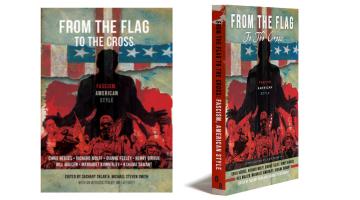BAR Book Forum: Samantha N. Sheppard’s “Sporting Blackness”
Black memory is a muscle trained, flexed, and disciplined by colonialism, enslavement, and racial terror, as well as collective Black struggle.
“Black sporting bodies can representationally and formally disrupt and protest their stereotypical depictions and conservative generic scripts.”
In this series, we ask acclaimed authors to answer five questions about their book. This week’s featured author is Samantha N. Sheppard. Sheppard is the Mary Armstrong Meduski ’80 Assistant Professor of Cinema and Media Studies in the Department of Performing and Media Arts at Cornell University. Her book is Sporting Blackness: Race, Embodiment, and Critical Muscle Memory on Screen.
Roberto Sirvent: How can your book help BAR readers understand the current political and social climate?
Samantha N. Sheppard: Sporting Blackness: Race, Embodiment, and Critical Muscle Memory can help us understand how sports media shapes past and present racial discourses. Sports matter, and this project takes seriously how and why sports matter politically, socially, and cinematically. Sports films—perceived as apolitical or innocuous because of their utopian, melodramatic, and idealized narratives—project and negotiate ideological conflicts about race on and off the playing field. While Hollywood fictional sports films focus on individualized stories of hard work and determination, they, like documentary and more experimental sports films, also use narratives about athleticism to dramatize historical shifts and broader social, cultural, and political issues. The spectacle of the sporting body, represented and mythologized through filmic and generic conventions, is central to these depictions, making embodiment—in terms of identity and athletic performance—a defining feature of the genre. With my book, I theorize race variously as a mode and format, performance and performativity, and code and decoding device. Throughout the chapters, I examine the performative embodiment of blackness that is confirmed and contested by representations of Black athletes in film, specifically, but also sports media and culture more broadly. I focus on a mode of production (sports documentaries), transmedia figures and formats (Boobie Miles as a racial icon in affiliated and unaffiliated Friday Night Lights’ narratives), gender performativity (issues of comportment and play in Love & Basketball and Juwanna Mann), and genre un-conventions (the revolt of the Black athlete in Hour Glass).
What do you hope activists and community organizers will take away from reading your book?
I hope that Sporting Blackness provides readers a sense of the capacities of the Black sporting body, sporting or otherwise. I want people to read the book and think about the powerful significance and signification of Black sporting bodies. In terms of takeaways, I really wanted the book to inflect Stuart Hall’s understanding of how Black people have used their bodies as “canvases of representation,” able to mean and mean again. I think there is a lot of power—intellectual, social, and political—in being able see depth, history, and mutability in images others deem superficial, apolitical, and/or static. To this point, the animating question of this book is: What happens when the visual legacy of blackness in American cinema collides with the visual legacies of Black sporting bodies?
I also deeply hope the theorization of “critical muscle memory” is especially useful to activist, organizer, athletes, and, well, everyone. Drawing on the work of Houston Baker, Harvey Young, Frantz Fanon, C.L.R. James, Elizabeth Alexander, and Grant Farred, the concept of critical muscle memory helps to articulate the material and tangled histories of Black athleticism in sports films and beyond. In the book I argue that black memory is a muscle trained, flexed, and disciplined by colonialism, enslavement, and racial terror, as well as collective Black struggle, achievement, and cultural engagement. Therefore, when it comes to my analysis of sports films, I argue that representations of Black sporting bodies contain critical muscle memories, embodied, kinesthetic, and cinematic histories that go beyond a film’s diegesis to index, circulate, reproduce, and/or counter broader narratives about Black sporting and non-sporting experiences in American society.
We know readers will learn a lot from your book, but what do you hope readers will un-learn? In other words, is there a particular ideology you’re hoping to dismantle?
I want readers to un-learn the ways in which they see Black representation in the sports film genre in terms of both the representational and formal measures of their depictions. In this regard, Sporting Blackness articulates a pivot from examining “skin in the game,” or the racial stereotypes attached to black athletes, to “skin in the genre,” which allows for an accounting of the formal and political consequences of the sports film and its rendering of the Black athletic body.
I also want readers to consider what it might mean for representations of black athletes to upend genre conventions. I specifically address this issue in my chapter on the revolt of the cinematic black athlete. I analyze Haile Gerima’s 1971 avant-garde sports film Hour Glass and attend to how this dialogue-less film layers its emplotment, and dense symbolic and sonic registers around the nascent revolutionary consciousness of its basketball playing subject. The revolt in the film is not only the athletes’ refusal to play but also Gerima’s refusal of sports film contrivances and graduate film school requirements that would have undone Hour Glass’s avowed radical politics.
Additionally, I want readers to understand the creative consumption of Black cultural producers that untethers racist depictions of Black athletes from their original sources. For example, in my chapter on infamous high school football star Boobie Miles from Friday Night Lights, I attend to how rapper Big K.R.I.T. and his lyrics and videos for “Hometown Hero” and “Boobie Miles” formally reclaim Boobie’s embodied failures on screen as a site of rhetorical agency, adopting prosaic and performative expressions of critical muscle memory. Big K.R.I.T. produces alternative, counter-ideological ways of seeing and remembering Boobie Miles, giving us a way to sonically imagine and legitimate Boobie’s successes and failures as connected to and outside of the transmedia character’s dominant narrative, temporal, and visual frames.
Who are the intellectual heroes that inspire your work?
When it comes to Sporting Blackness, the work has been deeply shaped by the work of Stuart Hall, Nicole Fleetwood, Michael B. Gillespie, Valerie Smith, Harvey Young, Judith Butler, and Ben Carrington. Most significantly, Stuart Hall’s work on Black popular culture is particularly invaluable and this book would not be what it is without his critical insights.
As a film scholar, I am continually inspired by the scholarship produced in my field specifically. My intellectual film and media heroes and interlocutors include Jacqueline Stewart, Miriam Petty, Anna Everett, Bambi Haggins, Beretta E. Smith-Shomade, Kara Keeling, Allyson Nadia Field, Kristen Warner, TreaAndrea Russworm, and Racquel Gates. It is a privilege to study and teach their groundbreaking and vital work on black film and media history, theory, and criticism.
In what way does your book help us imagine new worlds?
I hope that Sporting Blackness provides a method and mode in which to look at sports film and media anew. I am insisting that Black sporting bodies can representationally and formally disrupt and protest their stereotypical depictions and conservative generic scripts. The book imagines and engages how the Black sporting body functions as an unruly historical force that exceeds the genres, scene, moments, and modes of constraint. In the end, I want the book to help people see the cinematic, athletic, creative, and critical possibilities of sporting blackness.
Roberto Sirvent is Professor of Political and Social Ethics at Hope International University in Fullerton, CA, and an Affiliate Scholar at Yale University’s Interdisciplinary Center for Bioethics, where he directs the Race, Bioethics, and Public Health Project. He is co-author, with fellow BAR contributor Danny Haiphong, of the book, American Exceptionalism and American Innocence: A People’s History of Fake News—From the Revolutionary War to the War on Terror.
COMMENTS?
Please join the conversation on Black Agenda Report's Facebook page at http://facebook.com/blackagendareport
Or, you can comment by emailing us at comments@blackagendareport.com



















